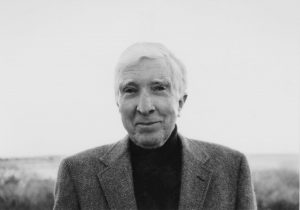
John Updike, whose novels and short stories have brilliantly chronicled the pleasures and frustrations of middle class life for five decades, was born in 1932 in Shillington, Pennsylvania. He graduated from Harvard College in 1954, and spent a year in England at The Ruskin School of Drawing and Fine Art in Oxford. From 1955-1957, he was a member of the staff of The New Yorker. His first novel, The Poorhouse Fair, and his first collection of short stories, The Same Door, were published in 1959.
John Updike’s collections of short stories include Pigeon Feathers, The Music School, Museums and Women and other Stories, Problems and Other Stories, Too Far to Go, Trust Me, The Afterlife, Licks of Love: Short Stories and a Sequel and Bech: A Book; Beck is Back; and Bech at Bay, the linked stories about Henry Bech. The Early Stories: 1953-1975 was published in 2003 and received The Pen/Faulkner Award for Fiction. His stories are published frequently in The New Yorker and have often been included in The Best American Short Stories and The O.Henry Prize Stories. In 1999, he edited and wrote the introduction for The Best American Short Stories of the Century.
John Updike won The National Book Award for his novel, The Centaur, in 1963 and went on to win The National Book Critics Circle Award, the Pulitzer Prize and the American Book Award for Rabbit is Rich, the third volume in his Rabbit (Harry) Angstrom saga. He was awarded a second Pulitzer Prize and second National Book Critics Circle Award for Rabbit at Rest, and he is one of the few people to have won both The National Medal of the Arts (1989) and The National Medal for the Humanities (2003). He has appeared twice on the cover of Time Magazine. His most recent novel, Terrorist, was published by Alfred A. Knopf in June 2006.